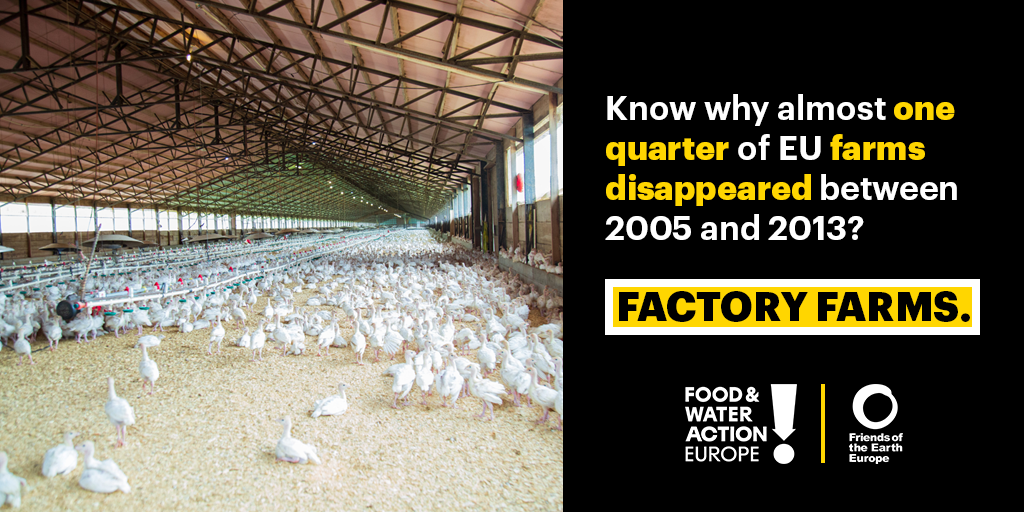Campaigners urge EU to phase out all factory farms by 2040
Read the report: The Urgent Case to Stop Factory Farms in Europe

Brussels, October 8 – Factory-farmed meat production in the EU is on the rise, and is putting the climate and human health at risk according to a new report released today from Food & Water Action Europe and Friends of the Earth Europe.
A rise in industrial meat production in the European Union has been accompanied by a rapid decline in the number of small farms. This has led to a dangerous rise of “factory farms”, characterised by large numbers of animals confined in crowded spaces.
The report reveals that:
- Unsafe working conditions on factory farms and slaughterhouses put workers in danger and increase the spread of diseases including COVID-19;
- Global production of soybeans for animal feed, and the resulting deforestation, are exacerbating the climate crisis, constituting around 7% of all greenhouse gas emissions originating from human activity;
- The European meat sector is dominated by a few large corporations who are increasing in size through mergers and acquisitions. Vertical integration threatens the existence of small-scale farmers, drops the prices for producers and leaves all the profits with agribusiness;
- The routine dosing of antibiotics to factory farmed animals is increasing the risk of antibiotic resistant bacteria ending up in meat;
- Manure from livestock farming severely contributes to air pollution (namely via ammonia emissions) and water pollution (via nitrate outputs) – a serious health risk for people living near factory farms.
Stanka Becheva, food and farming campaigner at Friends of the Earth Europe said: “Intensive animal farming is on the rise in Europe and it has already had devastating impacts on nature, peasant farming, our health and rural areas. The COVID-19 crisis has proved the fragility and inhumanity of the system which makes cheap meat possible, and how much it depends on unethical and unfair conditions for workers. We need urgent action from EU and national policy makers to change this.”
David Sánchez Carpio, director of EU affairs at Food & Water Action Europe said: “The rise of factory farming in Europe is the result of misguided political choices. The European Commission should use the Farm to Fork strategy to shift this trend, ban factory farms in Europe and to support a just transition into a socially and environmentally friendly livestock sector.”
The European Commission’s Farm to Fork strategy pledges to reduce the environmental and climate impact of animal production. However, no concrete actions are suggested to tackle the root causes of the problem.
Friends of the Earth Europe and Food & Water Action Europe are calling on the European Commission use its upcoming ‘legislative framework for sustainable food systems’ to:
- Propose concrete action to stop the construction of new factory farms and phase out existing ones by 2040.
- Develop a transition fund for workers in factory farms and the meat industry to shift into more sustainable jobs
- Support sustainable small-scale livestock producers and decentralised meat processing facilities that contribute to rural development
ENDS
***


